—story by Kate Prengaman
—photos by TJ Mullinax
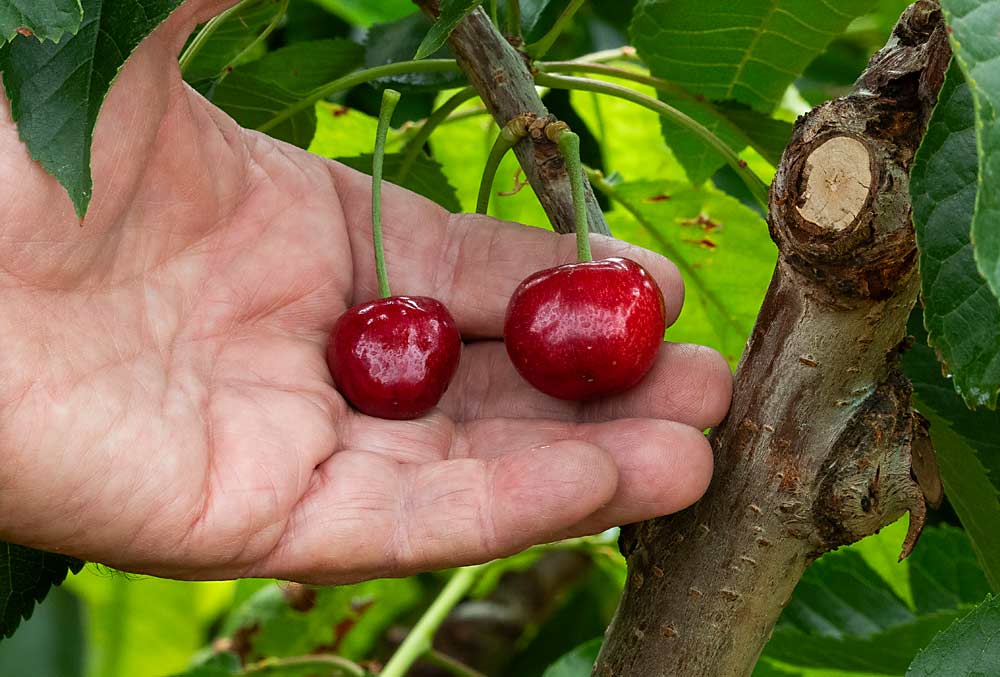
A decade ago, there was an odd, early ripening cherry tree in one of grower Terry Fewel’s Bing blocks. Workers snacked on the fruit, since it would be overripe and worthless by harvest.
“We couldn’t think what it was because they were huge, 8.5 row,” Fewel said.
Today, Fewel’s orchard in Washington’s Yakima Valley has 17 acres of that outlier coming into production. After demonstrating that it was genetically unique, he patented it in 2019 and hopes to sell it to the wider industry under the trademark name “Zillazeus.” (The cultivar, commonly shortened to “Zeus,” is patented as TF 7142.)
Fewel believes that with the cultivar’s size and harvest timing, three to five days ahead of Chelan, there will be strong interest in it. And if interest is strong enough, he envisions building a club management model, with growers paying small royalties on Zillazeus production to eventually build marketplace recognition.
But before he can get there, Fewel needs to harvest enough Zillazeus this year to see how it handles commercial packing, shipping and storage. His packer, Monson Fruit Co. of Selah, declined to comment on the variety until it has more experience handling the fruit.
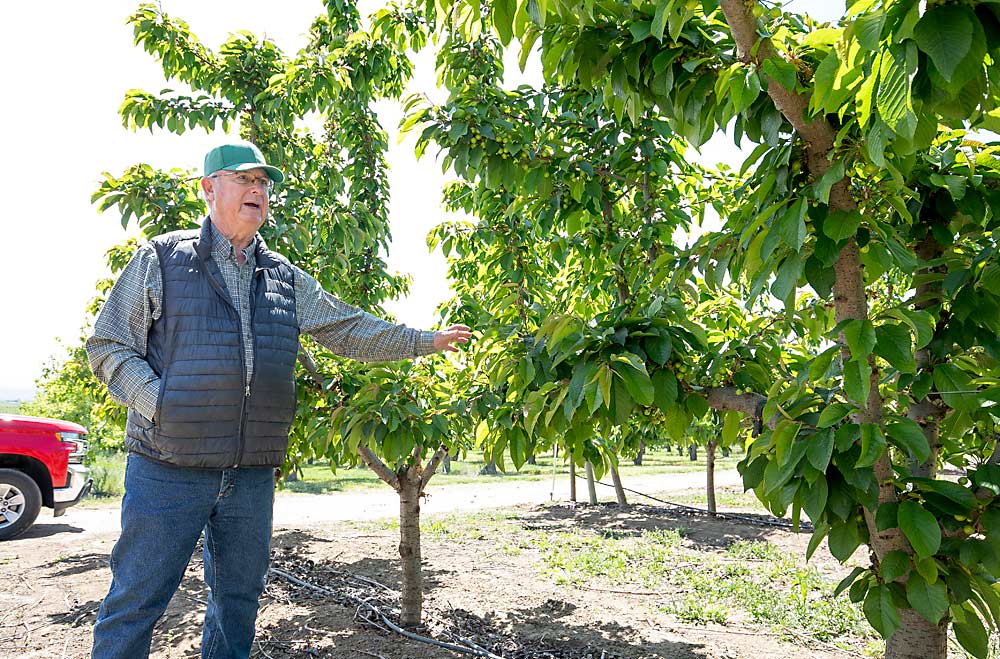
To boost production from his young orchards, Fewel tried a hybrid system that combines a traditional two-leader cherry planting with UFO-trained leaders to temporarily fill the space in between.
“There’s a lot of fruit on these puppies,” he said of the upright fruiting offshoots when Good Fruit Grower visited in early May. “For the third year, this is an incredible crop.”
Fewel started the trees with four leaders, training two up in the traditional system he prefers to farm and bending the other two down to the wire on each side. The result: three to five uprights loaded with fruit between the two primary leaders of each tree. Fewel plans to crop the offshoots for a few years and cut them back as the primary leaders grow.
“We’re after a two-leader tree; we just didn’t want to wait for it to fill in,” he said.
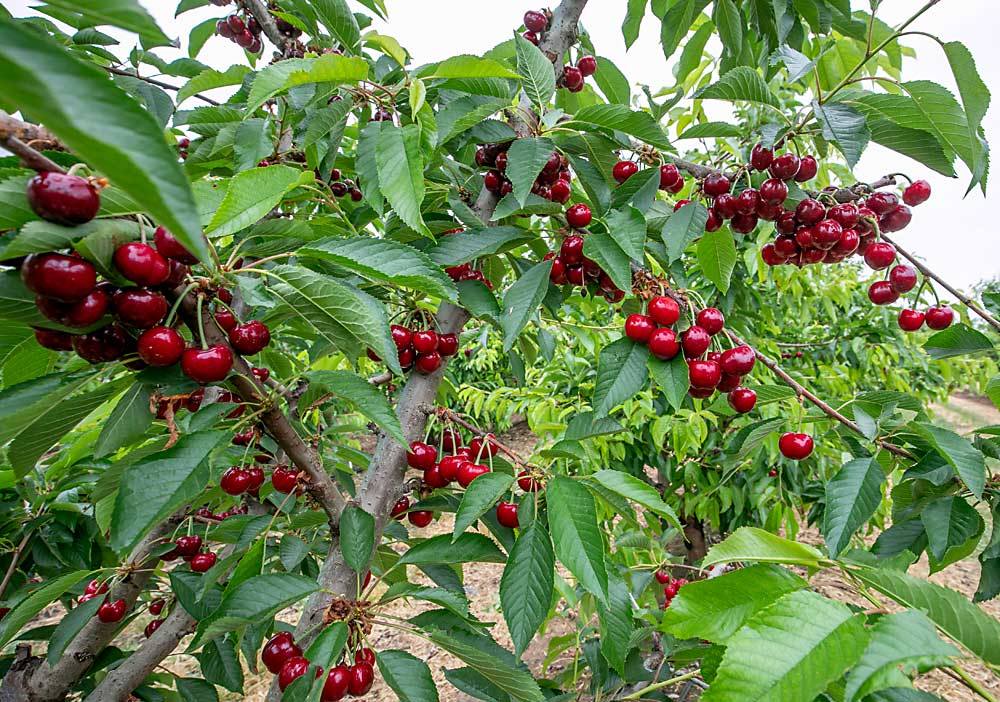
Good Fruit Grower reached out to several other Yakima Valley growers who have planted the cultivar, but they declined to comment on specifics since the trees had not yet come into production.
In addition to growing style, he’s also experimenting with pollinizers. Because Zillazeus blooms so early, it’s been a challenge to find the right match in proven Northwest cultivars. Some years, Lapin has been a good fit, but this year it was several days behind the new cherry, and Fewel found himself pollinating with an electrostatic sprayer. Royal Tioga times well, but he doesn’t love the cherry itself.
Another downside is that birds from across the valley flock to the early ripening cherry.
“Birds will be on the fruit the minute it’s red, so I am getting ready,” Fewel said while talking with Good Fruit Grower and taking a call about an order for a ton of sugar to spray on as a bird deterrent.
Other positives he highlighted: The cultivar seems to have low susceptibility to mildew and pitting, and it responds well to GA. And, he said, “it’s very easy to raise 9.5 or 9 row,” with very little 11-row fruit.
Willow Drive Nursery licensed the Zillazeus cherry for propagation. President Jim Adams said there’s been quite a bit of interest, though tree orders are down generally.
“It’s a good replacement for Chelan. Having something that eats better and is bigger and juicier, I think, will help to better shape the market,” he said. “This is the first year we are ready to get it going, and we grew a bunch for 2025 on speculation.”
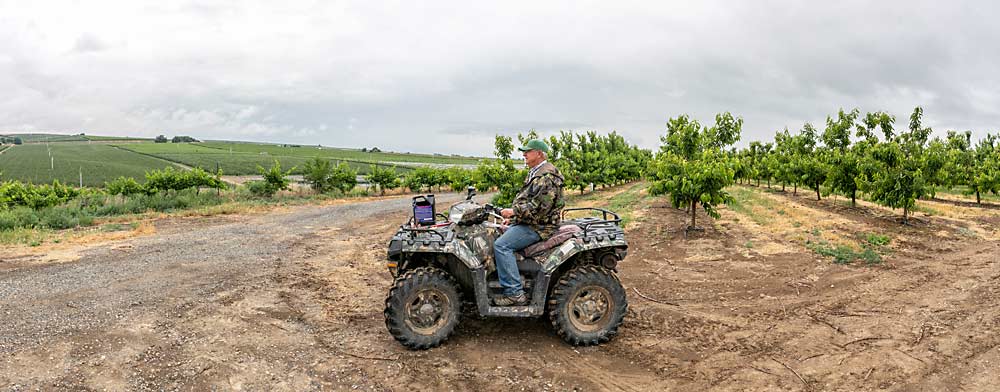
In addition to the tree royalty, growers who want to plant must sign an agreement to pay 2.75 cents per packed pound, Fewel said, though he’s open to any warehouse willing to get involved. Growers in the club can then set quality standards for size and pressure requirements for Zillazeus-branded cherries, while everything else can be sold as a dark sweet, he said.
“I don’t want a dictatorship, I see it as a club where growers have input of what they’d like to see this cherry be,” Fewel said.
That’s a relatively rare approach in the cherry market. While there are a few branded proprietary cherries marketed by different companies, most are a premium, niche product only certain retailers are interested in, said Karley Lange, director of domestic promotions for Northwest Cherry Growers.
“Everyone in the industry has decided that you want dark sweet and light sweet; we don’t want consumers to get confused because we go through the varieties so quickly,” she said.
So, Fewel’s vision is charting a new path, to borrow Adams’ analogy, but he’s optimistic the cultivar will bring value to growers.
“I pray it’s going to be a cherry that keeps family farmers in business,” Fewel said. •






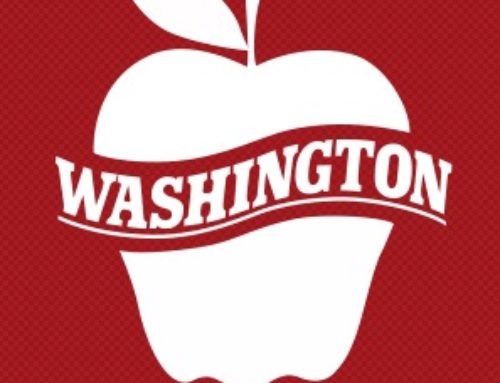
Leave A Comment